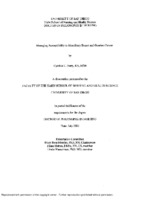Managing susceptibility to hereditary breast and ovarian cancer
View File(s)
Visitor Statistics
Visits vs Downloads
Visitors - World Map
Top Visiting Countries
| Country | Visits |
|---|
Top Visiting Cities
| City | Visits |
|---|
Visits (last 6 months)
Downloads (last 6 months)
Popular Works for Perry, Cynthia E. by View
| Title | Page Views |
|---|
Popular Works for Perry, Cynthia E. by Download
| Title | Downloads |
|---|
View Citations
Citations
The recent identification of Breast Cancer 1 (BRCA1) and BRCA2 genes offers an opportunity for high-risk individuals to learn whether they may be genetically predisposed to develop breast and/or ovarian cancer. The purpose of this study was to examine how unaffected women, identified as BRCA positive and variant of uncertain significance (VUS) mutation carriers, managed their susceptibility to hereditary breast and ovarian cancer (HBOC). Thirty North American women ranging in age from 22 to 60 years responded to open-ended interviews. These interviews were analyzed using constant comparative method to generate a grounded theory. Managing Susceptibility was identified as the basic social process, which characterized how these unaffected women responded to genetic testing and managed their risk of HBOC. Five categories were found that explain the actions, interactions, and consequences of managing susceptibility. These were: (a) gaining awareness, (b) confronting uncertainty and getting tested, (c) disclosing results, (d) deliberating and making risk management decisions, and (e) reflecting on actions. These women regarded breast and/or ovarian cancer as a predictable outcome, given their family history, and felt they had a responsibility to their family to prevent this danger if possible. After gaining awareness of their increased risk, they sought genetic counseling to take responsibility for their perceived susceptibility and were influenced by feelings of obligation to their family. Participants disclosed their test results to seek support and because of a sense of duty to inform their family members of their risks, no matter how difficult it was for them personally. They also felt they had a responsibility to persuade their family to act on the information. Past family and personal experiences, present view of themselves and their relationships, and aspirations for the future were all part of their complex risk management decision making. Engaging in risk management was seen as providing them with control over their susceptibility to HBOC. Those choosing prophylactic surgeries wanted to prevent cancer, as they were not satisfied with the limitations of vigilant surveillance which provided only early detection. By taking these measures they not only gained some control over their lives, but as importantly, could maintain their identity as mother and nurturer. The study's findings support other research in genetic testing and risk management and have important implications for health policy, nursing practice, and future research.
This dissertation has also been disseminated through the ProQuest Dissertations and Theses database. Dissertation/thesis number: 3184482; ProQuest document ID: 305352219. The author still retains copyright.
This item has not gone through this repository's peer-review process, but has been accepted by the indicated university or college in partial fulfillment of the requirements for the specified degree.
| Type | Dissertation |
| Acquisition | Proxy-submission |
| Review Type | None: Degree-based Submission |
| Format | Text-based Document |
| Evidence Level | Other |
| Research Approach | Qualitative Research |
| Keywords | Hereditary Cancer; Prophylactic Care; Familial Obligation |
| CINAHL Subject(s) | Breast Neoplasms; Disease Susceptibility; Genetic Screening; Ovarian Neoplasms; Breast Neoplasms--Familial and Genetic; Disease Susceptibility--Psychosocial Factors; Genetic Screening--Psychosocial Factors; Ovarian Neoplasms--Familial and Genetic |
| Grantor | University of San Diego |
| Advisor | Mueller, Mary Rose |
| Level | PhD |
| Year | 2005 |
All rights reserved by the author(s) and/or publisher(s) listed in this item record unless relinquished in whole or part by a rights notation or a Creative Commons License present in this item record.
All permission requests should be directed accordingly and not to the Sigma Repository.
All submitting authors or publishers have affirmed that when using material in their work where they do not own copyright, they have obtained permission of the copyright holder prior to submission and the rights holder has been acknowledged as necessary.
Related items
Showing items related by title, author, creator and subjects.
-
Experiencing predictive genetic testing in families with Huntington's disease and hereditary breast and ovarian cancer
Hamilton, Rebekah J.Predictive genetic testing for Huntington's disease (HD) and hereditary breast and ovarian cancer (HBOC) is a relatively new medical test. Research to date, has focused on: (1) the psychological impact of genetic testing, ... -
Optimism and emotional well-being in women with breast cancer: The role of mediators
Matthews, Ellyn E.Diagnosis and treatment of breast cancer in women, with an estimated incidence of 182,800 new cases in the United States in 2000, is associated with psychological difficulties and diminished emotional well-being. The role ... -
Breast cancer risk perception, knowledge, attitudes, beliefs and screening behaviors of Chamorro women in Guam
Cruz, Teofila P.Background: Breast cancer is a serious public health issue in Guam and in the world. Chamorro women in Guam have the highest incidence and mortality rates of breast cancer among other ethnic groups of women living in Guam. ... -
United States resident, Jordanian and Palestinian women's participation in breast cancer screening
Kawar, Lina N.Breast cancer is a threatening disease to women worldwide. Breast cancer screening (BCS) is a key to early detection and reduced mortality. Factors predicting women's participation in BCS have been well studied in the ... -
Patterns of fatigue and factors influencing fatigue during adjuvant breast cancer chemotherapy
Berger, Ann M.Women beginning adjuvant chemotherapy for breast cancer seek information from health professionals regarding fatigue, but knowledge regarding this distressing symptom is currently limited. The purposes of this study were ...





